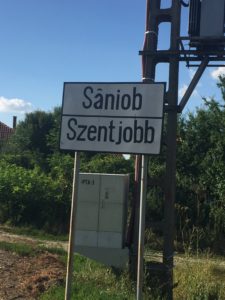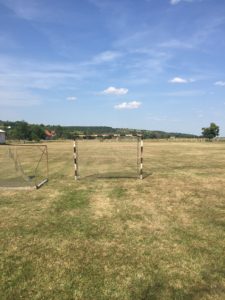My First Week in A Romanian Orphanage
In my psychology class last semester, we discussed child development focusing on Romanian orphanages as an example of an environment in which kids struggled to develop socially due to a lack of attention resulting from overcrowding. So, when I realized that my last three weeks in Romania would be spent living in a Romanian orphanage, I was anxious and uncertain about what to expect.

With one week in the orphanage complete, I am happy to report that the living conditions and the kids are good! The orphanage is clean and has about 25 kids living here, and the kids are just as energetic and social as any of the other kids I have met so far. The kids living in this orphanage are aged 10-17, and another home nearby has all of the orphans that are younger than ten. The kids in both orphanages come together to eat lunch and dinner. While the food is not as great as with my host family back in Szalard, it is still good.
While the orphans do not speak much English, within about 15 minutes of my arrival, three of the boys asked me what seemed to be a very important question: “Barcelona or Real?” While I don’t have much of a preference for either of these Spanish soccer teams, I quickly said “Real” and was greeted with cheers from two of the boys and a groan from the third. The Barcelona-Real rivalry runs strong even here in a little Transylvanian orphanage, it seems. Next was an even more important question: “Fútbol?” For the rest of the day, and most of the first week, we kicked a soccer ball around in the yard outside the orphanage or in a field down the street.

On Monday night, my second night in the orphanage, one of the girls was celebrating her 17th birthday. At around 9:00 p.m., we all gathered in a room upstairs, ate a big dinner, and blasted a mixture of Romanian, Hungarian, and American music. The kids sung “Happy Birthday” in English, Hungarian, Romanian, and German. Finally, a big cake was brought out covered in chocolate icing. Several people stood and talked about the birthday girl. The celebration was very similar to parties in the United States.
My class on Wednesday offered a new experience that was quite different than most other classes because we had a TV crew filming it! Duna, the local Hungarian TV Station, came to my class and filmed my students speaking English and playing some games. After class, I was interviewed for about ten minutes and asked questions about my time in Romania so far, why I had come to teach English, and, of course, about the food. Being interviewed on foreign TV was a surreal experience that I won’t forget.
Across the street from the orphanage is an old church that I did not think anything of until Thursday when we walked over to see the excavations taking place. The church was built after relics from St. Stephen, including his hand, were brought to the area, and a fortress was also constructed. While the fortress has long been destroyed, archaeologists began to dig out what remains of the fortress and its preserved artifacts. Before the World Wars, the area hosted a yearly pilgrimage in September. attended by as many as 15,000 people. Today, the number has dropped below 1,000 people. While I was engrossed in the history of the site, the children accompanying me were caught up with a stray kitten they found wandering the grounds.
